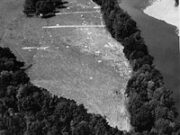The Westo Indians, who lived along the Savannah River near Augusta from about 1660 to 1680, were one of the most important Native American groups in the southeastern United States. They obtained firearms from the English in Virginia before most other Indians in the Southeast did, which gave them a tremendous military advantage over bow-and-arrow Indians. The Westos used this advantage to enslave natives throughout Georgia, Florida, and the Carolinas. They then traded their captives to colonists in Virginia and South Carolina for items of European manufacture, including guns, ammunition, steel hatchets, blankets, and glass beads. Since firearms and ammunition were the key to Westo dominance, the group fought hard to establish a reliable source for these goods while at the same time denying such access to other native groups.
Also known as the Rickahocans or Chichimecos, the Westos originally came to the Southeast after having been driven out of the Northeast by the powerful Iroquois. The Westos were one of many groups the Iroquois drove off or destroyed in their effort to monopolize the Northeast gun trade, and it is clear that the actions of the Westos in the southeastern United States were an imitation of Iroquois tactics. Because of their vulnerable position in the beginning, the Carolina colony befriended the Westos and used them as a barrier against the threat of Spanish aggression from the south. Once the Carolina colony had grown strong enough to protect itself, the Westos were seen as an impediment to the expansion of trade out of Charleston. In order to remove them, a group of Carolinians known as the Goose Creek Men secretly armed the Savannah Indians, who destroyed the Westos in the Westo War of 1680 and opened the way for a significant expansion of the deerskin and slave trade.




